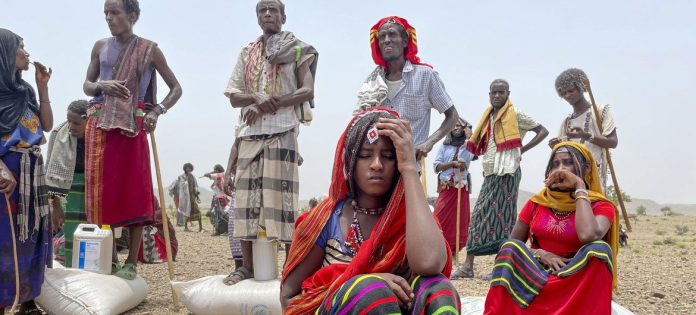Trucks with food assistance and fuel have reached Tigray and Afar following the declaration of the humanitarian truce.
After 17 months of conflict in Ethiopia, almost 40% of Tigrayans are suffering an extreme lack of food, according to data released by the World Food Programme (WFP). According to the Tigray Emergency Food Security Assessment, 83% of people are food insecure.
The situation in Ethiopia
Conflict erupted in Tigray in November 2020 between federal troops and forces loyal to the Tigray People’s Liberation Front (TPLF). The war spilled over into the neighbouring regions of Amhara and Afar, killing thousands of civilians, and displacing millions across northern Ethiopia, and into neighbouring Sudan.

Hospitals, markets, schools and farms have been destroyed by conflict over the last 17 months, and hardship is being faced by local people as a result. Furthermore, the relentless drought in Ethiopia will leave more than 6.8 million people in need of urgent humanitarian assistance.
“The conflict in Ethiopia has caused terrible suffering for millions of people across Afar, Amhara, Tigray, Benishangul Gumz and Oromia”, said UN Spokesperson, Stéphane Dujarric, in a statement issued on behalf of Secretary General António Guterres.
The northern region has not received any aid deliveries by road since last December, due to the ongoing fighting.
Food shortage
Diets are increasingly impoverished as food items become unavailable and families rely almost exclusively on cereals. At the same time, families are having to limit portion sizes and the number of meals, to make whatever food is available stretch further.

In terms of nutrition, 13% of Tigrayan children under five, and half of all pregnant and breastfeeding women, are malnourished, leading to poor pregnancy outcomes, low-birth weight, stunting and increased maternal death.
In the neighbouring Amhara region, hunger has more than doubled in five months because the region bore the brunt of recent fighting between the Ethiopian Government’s military forces and Tigray forces.
WFP estimates that on average, crisis-affected families in northern Ethiopia were getting less than 30% of their caloric needs in the past months, pushing people deeper into crisis.
Aid operations
Many aid activities remain reduced or suspended in Tigray, UN humanitarians reported last week, when fewer than 7,000 people received food assistance – an extremely small fraction of the 870,000 who UN colleagues are trying to help each week.
Humanitarian partners warn that less than 10% of the required quantity of seeds have managed to make their way Tigray before the start of the planting season, which is only a month away. In accessible parts of Afar, more than 112 000 people have received food assistance since late February, the UN reported last week.
Ceasefire and food trucks
March 25, the Government of Ethiopia declared an indefinite humanitarian truce, effective immediately and the commitment by Tigrayan authorities to a cessation of hostilities effective immediately.

The Secretary-General urges all parties in this conflict to build on this encouraging development to take the necessary steps towards a long-term ceasefire.
When food trucks and fuel reached Tigray, Guterres called on all parties to keep the momentum and to follow through on their commitments to facilitate the provision of humanitarian assistance to all people in need. He reiterates his call for the restoration of public services in Tigray, including banking, electricity and telecommunications, as well as commercial access.
Read more here:

